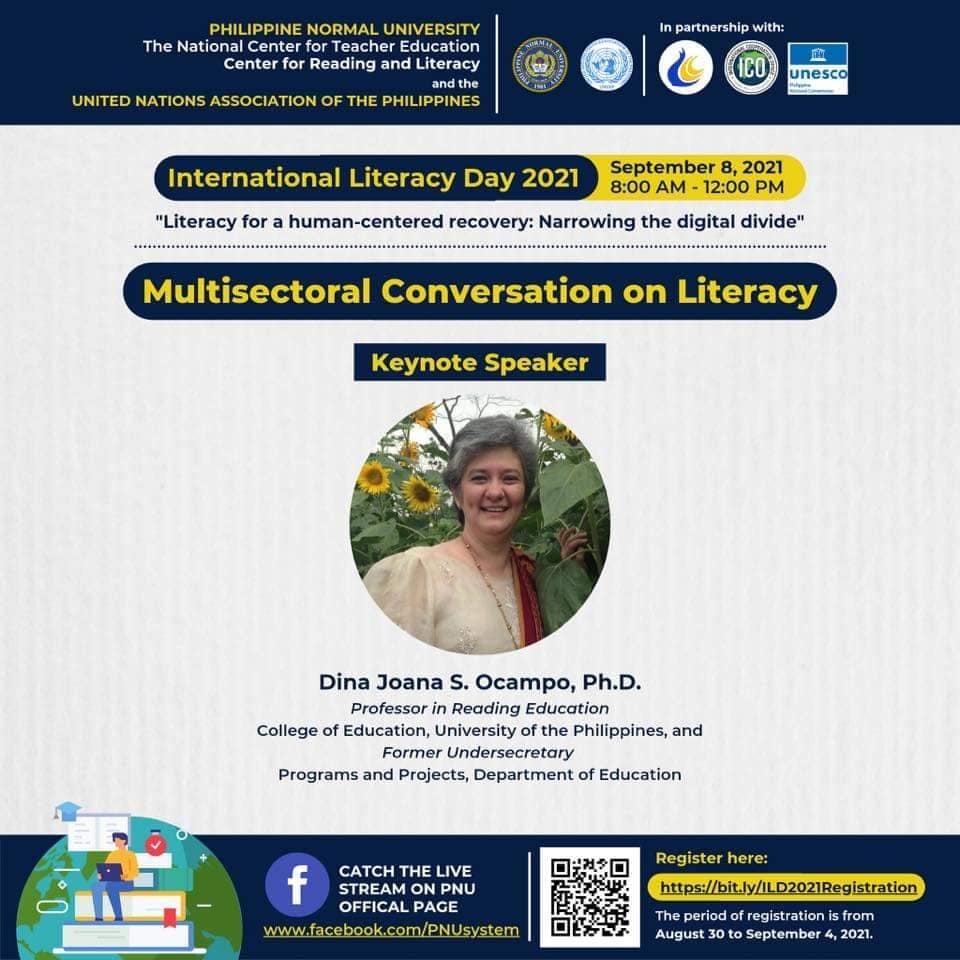
In celebration of the International Literacy Day (ILD) 2021 with the theme “Literacy for a Human-Centered Recovery: Narrowing the Digital Divide,” the Philippine Normal University (PNU), the National Center for Teacher Education and the United Nations Association Philippines (UNAP) in partnership with the Literacy Coordinating Council (LCC), DepEd-International Cooperation Office (ICO) and UNESCO conducted the Multisectoral Conversation on Literacy on September 8, 2021 via Zoom. The said forum aimed to: 1) build awareness on various technology-enabled literacy practices and initiatives developed and implemented by different stakeholders of education, 2) identify issues, concerns and challenges on literacy, and 3) propose solutions to address different challenges encountered in promoting literacy for human-centered recovery. The said event was well-attended by educators from public and private institutions and representatives from government agencies among others in Zoom which was also simultaneously broadcasted in PNU’s and LCC’s Facebook Pages.
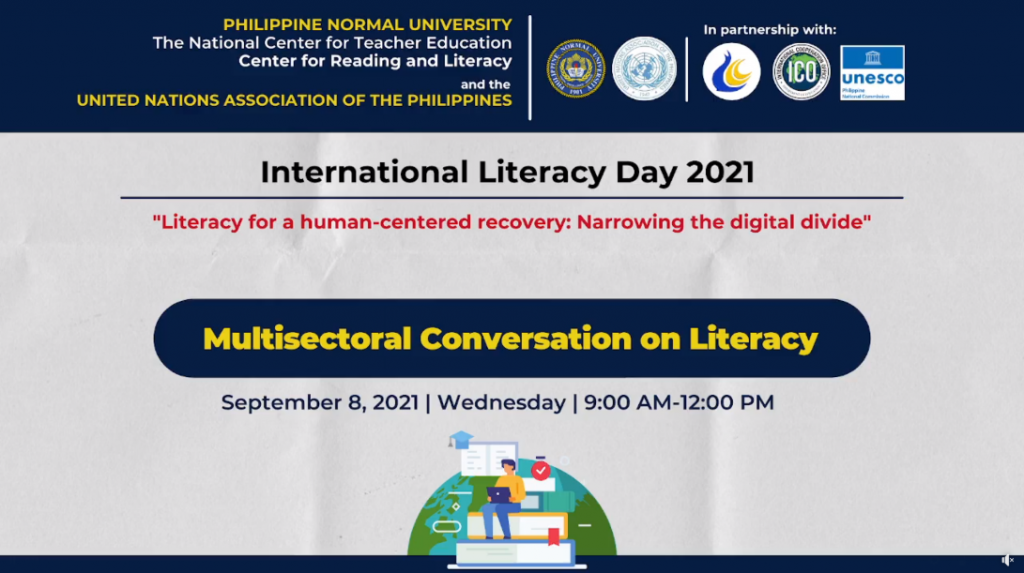
Hosted by Dr. April Ann Curugan, the said event commenced with the singing of the Philippine National Anthem followed by video presentations from the PNU. During the Opening Remarks, Dr. Bert Tuga, President of PNU, mentioned that the current situation brought about by the pandemic has magnified the challenges in education and made it more fragile. However, the fact that the ILD is being celebrated all over the world, it proves that hope may still be found in every situation. He also said that we must prioritize resiliency and sustainability as two of the pillars of the human-centered recovery plan. Meanwhile, Department of Education Secretary Leonor Briones shared to the participants some of the agency’s best literacy practices which were the establishment and strengthening of the Basic Education Learning Continuity Plan (BE-LCP), synchronization of priorities of different strands and offices, augmentation of the information and communication technology service even amidst the pandemic and the digital divide. Dr. Editha Pillo, President of UNAP, reminded everyone that at these challenging times, we are tasked to assist the humanity and the development of a strong sense of well-being, to narrow the ignorance, to advance literacy, to equip the people with the skills and to open opportunities towards quality education. For Dr. Diosdado San Antonio, LCC Chairperson and DepEd Undersecretary for Curriculum and Instruction, he said that the education has been disrupted due to the COVID-19 but it has also made everyone passionate of learning continuity, accountable of securing a safe environment for the learners and involved in the practice of “bayanihan.” Also, Undersecretary Ernesto Abella, Office-in-Charge of the Philippine National Commission (PNC) for UNESCO, tackled the aggregated results of functional literacy rate based on the 2019 Functional Literacy, Education and Mass Media Survey (FLEMMS) and the importance of making inclusive technology regardless of the modality involved. He highlighted the cities and municipalities in the country that have local LCCs and that were recognized for their remarkable contributions in promulgating literacy. He closed his speech by saying, “We should not just reminisce but rather rehearse the ancient wisdom especially in human recovery.”
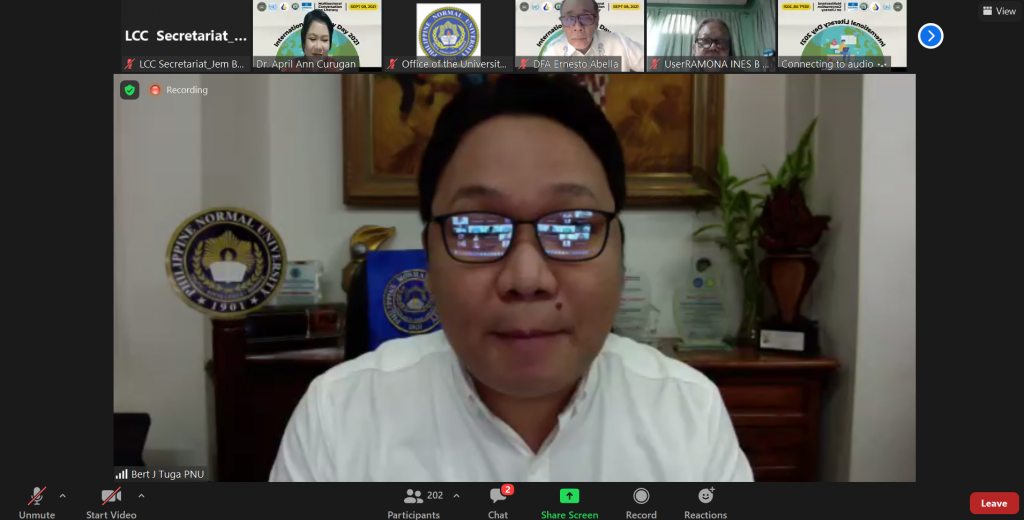

As for the Keynote Address, Dr. Dina Joana Ocampo, Professor of Reading Education, College of Education from the University of the Philippines, and Former Undersecretary for DepEd’s Programs and Projects, started her presentation with the adverse effects and impacts of COVID-19 mutisectoral, principles of human-centered recovery and diminishing the digital divide. She mentioned that children suffer from social disconnection due to the loss of contact and inability to play in the past months caused by the schools closure. She also emphasized that the key to human centered recovery is investing in people and institutions that protect them. She posed questions whether if people were being put first and considered in different offices. She also asked if people were ready for possibilities for other lockdown or blended learning and if they have been able to emerge in roles that they can draw into and train themselves for the incoming new ones. She highlighted that everyone must grapple in the evolving definition of literacy to narrow the digital divide. To further do this, one must acknowledge it and apply the 8 core skills namely: 1) Reading, 2) Writing, 3) Viewing, 4) Listening, 5) Speaking, 6) Making Meaning, 7) Technology and 8) Creativity in different contexts. Workers must also develop lifelong learning through multiliteracies such as computer and financial literacies. These will help them adapt to change which can also be achieved through upskilling and cross-skilling. As a conclusion, she left the participants with the thought, “We need to embrace the new definition of literacy which includes technology and creativity. We need to prepare learners for all the multiliteracies they need so they can survive the world that is coming to them. We cannot go back to the normal anymore… we need a new world; therefore, new strategies and we need new teachers who can bring children forward confident and powerful.”
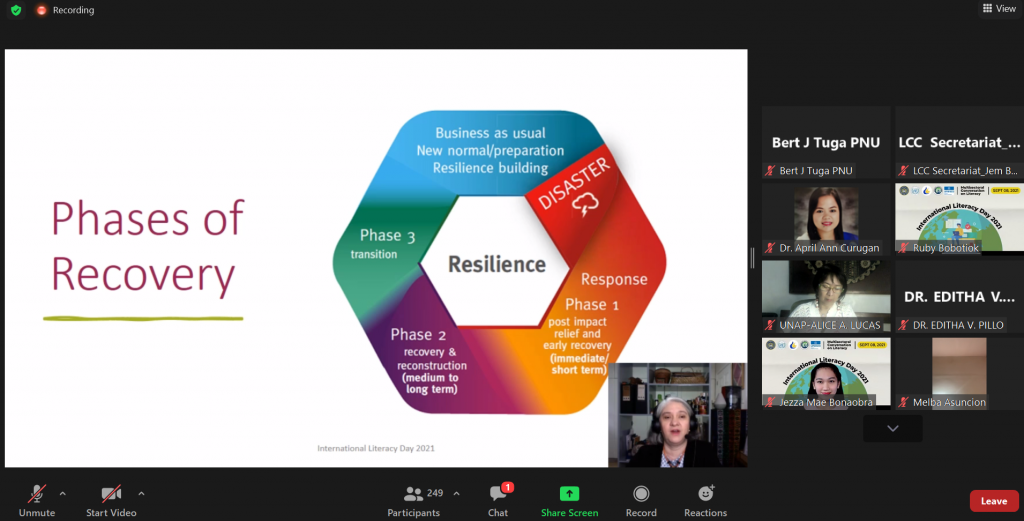
For the next part of the program, a Panel Discussion has been facilitated starting with Dr. Heidi Macahilig, Associate Dean of the Graduate Teacher Education Faculty, College of Graduate Studies and Teacher Education Research of PNU, followed by Dr. Teresita Inciong, Executive Director and Chairperson of Early Childhood Care and Development (ECCD) Council, then Mr. Geomel Jetonzo, “Brigada Pagbasa” Program Director of World Vision Development Foundation, and Ms. Mardilyn Garcia, President of Paulinian Volunteers for Community Development. During this session, the 4 speakers shared their respective programs and projects on literacy launched by their represented institutions and its impact in the communities in the peak of the pandemic.
Dr. Macahilig talked about the digital divide, its toll on the students and education as a whole, and the PNU’s initiatives such as the “Kaway Aralan sa Bagong Kadawyan” and the ePNU in response to pandemic’s challenges. The former is a contextualized version of flexible learning modality wherein it required a review and recalibration of curricula of undergraduate and graduate programs to focus on the most essential course intended learning outcomes and to align with the flexible learning strategies and the alike. While the latter is the university’s upgrading of its existing learning management system which gave way to the training and provision of technical assistance to the faculty and staff in preparation of the flexible and blended learning. Other projects shared were the “Project Tanglaw” and “Kaway.”
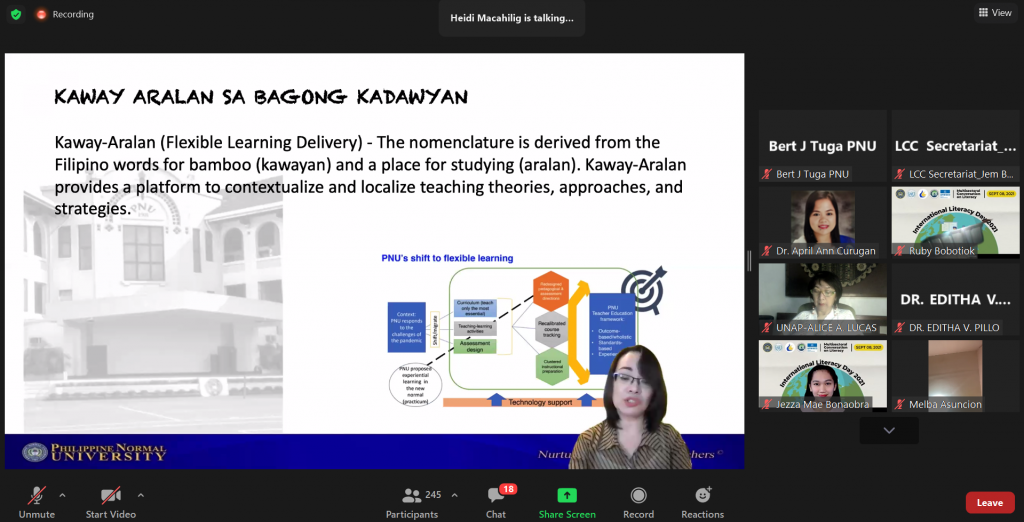
Afterwards, Dr. Inciong focused her discussion on literacy issue being a complex matter. She elaborated the Republic Act 10410, ECCD being the foundation of the learning continuum, its crucial role in a child, and the ECCD System Framework. She reiterated that the schools may be closed but it does not mean that the learning of children is also closed. She called everyone to continually support the children’s learning experiences and not to stop training the teachers and the parents on this journey.
On Mr. Jetonzo’s presentation, he pointed out the “Brigada Pagbasa,” a national movement for reading that aims to bring together all education champions and supporters to contribute to nation building by helping all Filipino children enhance their reading skills in the context of partnership. His talk also included the Brigada Pagbasa Program Cycle, Learning in Times of Emergencies and Driving of the Reading Culture among the learners. He emphasized that the future of children is worth investing. He encouraged everyone “to support the program… because to sustain the gains and to bridge the gaps as we embark on the second year of emergency remote learning, every member of the community must be equipped to perform their roles in effectively educating the children.”
The last panelist, Ms. Garcia, instilled to the participants to think globally and to turn their lenses into multifaceted ones. Her rich experiences were drawn from their project “Handog Pag-ibig,” a multifaceted project rooted in fostering inclusive development by capacitating the holistic empowerment of indigenous communities. Based on her immersion to the indigenous communities, she said that it is important to possess empathy, education and empowerment to truly realize inclusivity in education especially at the time of the pandemic. She closed her speech by saying “It is about putting human at the center of everything… Literacy should ignite a holistic development.”
After the presentations, Mr. Benjo Basas, National Chairperson of Teachers’ Dignity Coalition (TDC) and Ms. Lindsay Barrientos, Executive Director of PNC for UNESCO, served as the reactors for the said event. After their sharing of insights, the group proceeded to the Open Forum and Awarding of Certificates.
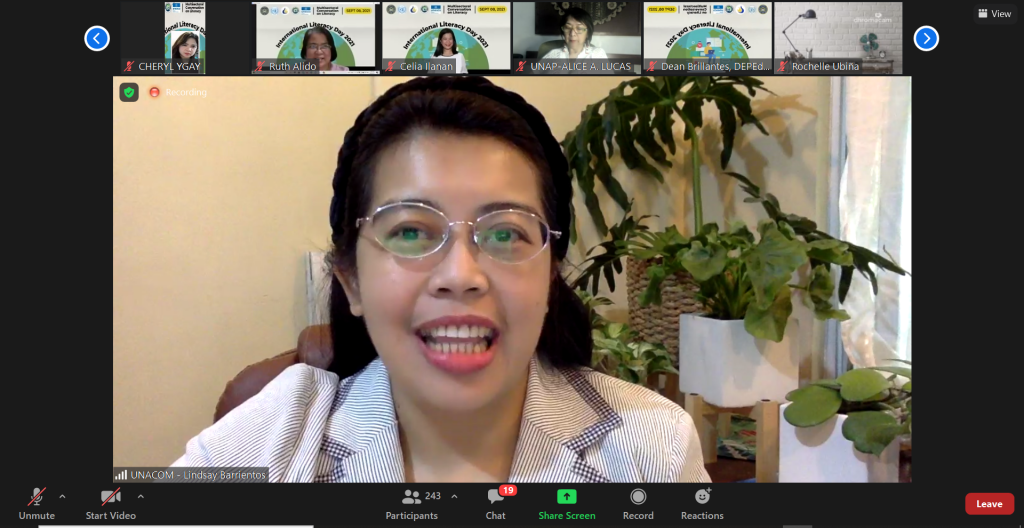
In conclusion, Dr. Margarita Consolacion Ballestors, Director of DepEd-ICO, leaned on the need to address the digital divide and the call for a worldwide efforts. She said that literacy must expand the possibilities to choose the kind of life everyone wants to live with. “Being literate is more than just being able to read and write but someone who can go beyond and forecast what is yet to come and is in there at the moment,” she noted.
The LCC Secretariat would like to thank the PNU and its partners for sharing this momentous event with them. Inputs shared during the forum are indeed valuable in the future endeavors of the Council on literacy.
To watch the replays of the recorded event, kindly click the links below:
Part 1: https://www.facebook.com/watch/live?v=804320186910134&ref=watch_permalink
Part 2: https://www.facebook.com/watch/live?v=350775066770641&ref=watch_permalink
Jem Beryline S. Bualat
